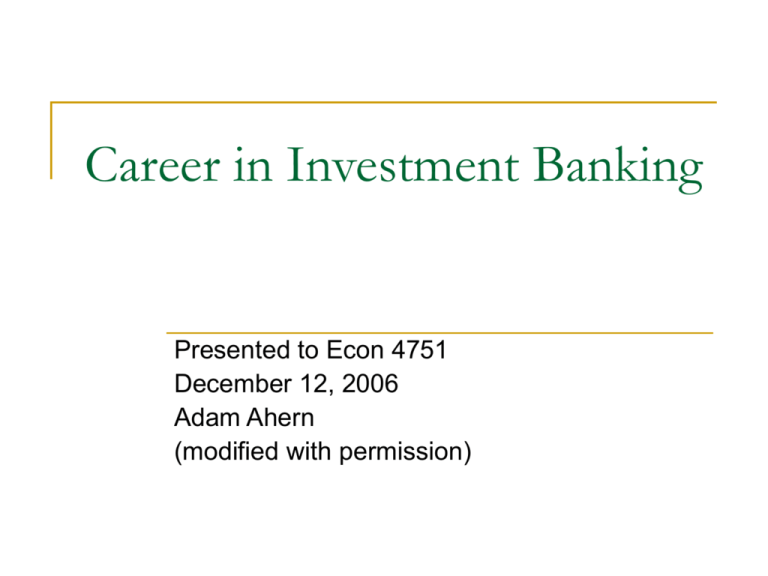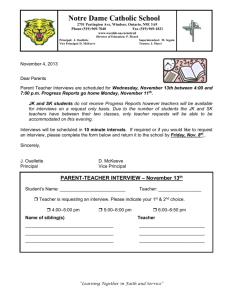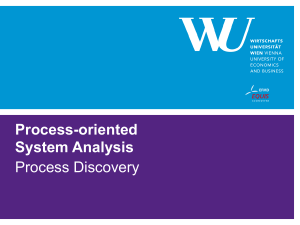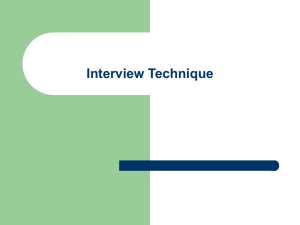Career in Investment Banking - the School of Economics and Finance
advertisement

Career in Investment Banking Presented to Econ 4751 December 12, 2006 Adam Ahern (modified with permission) What is an Investment Bank Three functions 1. I-banking (corporate finance) 2. Trading 3. Research Functions are mutually reinforcing What an i-bank does Raises money IPO Debt offerings (distressed debt) Equity (private placement and follow-on offerings) Provides advisory services Valuations M&A I-bank Products and Industries Product Distressed debt Corporate bonds Private placements Follow on offerings M&A LBO Divestitures Industry Financial Services (FIG) Consumer Energy Technology Healthcare Examples of Investment Banks Bulge Bracket (BB) – Transactions typically >$500MM Goldman Sachs Morgan Stanley Lehman Brothers Middle Market (MM) – Transactions typically $50MM - $500MM RBC (Royal Bank of Canada) Capital Markets Piper Jaffray Houlihan, Lokey, Howard, & Zukin Goldsmith Agio Helms Bank of America Different culture, work experience, and prestige Compare performance with League Tables from Thomson Financial Positions Analyst – 2 year program Associate – 3 years (after MBA) Vice President – 3 to 5 years Director Role of an Analyst 100 hours per week average (6-7 days) No guaranteed vacation or holiday Responsibilities Valuations in excel “Comps”/”spreads” (industry research) Create pitchbooks (www.investopedia.com) and presentations Grunt work Benefits Excellent pay Great exit ops (PE, B-school, industry) Admittance to top B-schools Types of Skills Required Skills Excel skills Accounting Finance concepts Willingness to work 100+ hour weeks No skills required! Attributes Hardworking Responsible Dependable Team Player Team Orientated Well Read Productivity Handle pressure Desires financial security Meets deadlines Problem solving ability Analytical Confidence Getting Hired Know the recruiting process and have a strategy Network early September – Information sessions and networking October – First round interviews (super day) November – Second and third round interviews December – Offers! Internship interviews January-February Harder from a non-target school Getting a interview is the hardest part Build your resume with finance and leadership experience Getting Hired (cont.) Must be more ambitious going after position GPA > 3.5 because it is used for screening GPA > 3.0 you still have a chance with lots of networking Have internships (preferably in banking or finance) Have a good story Demonstrate fit Attitude more important than technical skills Networking Do your research and be prepared! Keep a log of all contacts Start with people closest and expand outward Identify contacts Internet Friends/relatives Informational interviews Student organizations and campus involvement Networking (cont.) Steps for contacting your network Email request (who you are, what you want, and your availability) Follow-up if no reply Set time to talk on the phone Send thank you note Pass along your resume Interview preparation Learn insider information Typical Interview Format First-round on campus 1-2 interviews with two people in each First-round “super day” Why i-banking, technical questions 6 interviews in the AM Lunch Either sent home or 6 interviews in PM Second-round 8 interviews with 1-2 people in each All questions fair game Fit Questions Common I-banking Interview Questions Tell me about yourself? Walk me through your resume? Why do you want to work in investment banking? What does an analyst do? Why do you want to work for our company? Tell me about a deal you follow? Why should I hire you? How can you compete with someone who has i-banking experience or is from Ivy? What are your strengths/weaknesses? Can you handle the long hours and stress? Where else are you interviewing? How are your analytical skills? Why did you choose the University of Minnesota It’s 8pm and you have a date with your girlfriend and the Director gives you a valuation that has to be completed by morning, what would you do? Why should I hire you? Common Technical I-banking Interview Questions Walk me through the financial statements? What happens to the financial statements if depreciation increases by $10, assuming a tax rate of 30%? How do you value a company? Walk me through a DCF analysis? How do you calculate WACC? What is free cash flow (FCF)? What is an LBO and when is it attractive? What is in a pitchbook? Reading List Wall Street Journal Financial Times Liar’s Poker Monkey Business The Accidental Investment banker Barbarians at the Gate Other People’s Money Measuring and managing the value of businesses Career Resources Your network (cedars, facebook, myspace) The Vault (www.vault.com) -insider information www.efinancialcareers.hk or students.efinancialcareers.hk (you should sign up for news and job alerts)







